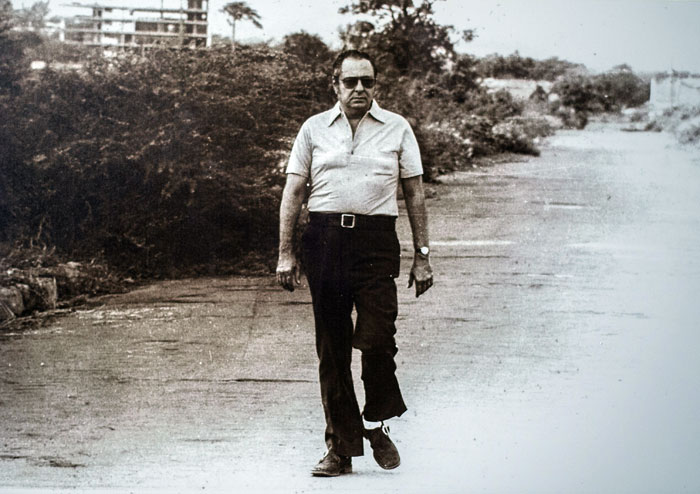12 de enero 2022

The Return of the Military

PUBLICIDAD 1M
PUBLICIDAD 4D
PUBLICIDAD 5D
The figure reasserting his possession of power, wasn’t a legitimately elected president, but the prison warden who has locked up an entire nation

January 10th marked 44 years since the murder of my father, Pedro Joaquin Chamorro Cardenal, journalist and director of La Prensa newspaper and a key figure in the political fight against Somoza. He was assassinated in 1978, by the dictatorship of Anastasio Somoza Debayle.
His painful murder marked a before and after in Nicaragua’s history. The general indignation the killing provoked among all sectors of the country, and the calls for justice, culminated in an explosion of national protest that unleashed the popular insurrection against Somoza.
Eighteen months later, the Somoza dictatorship, which had appeared invulnerable, was defeated by a political-military movement, led by the Sandinista Front and backed by a great national and international alliance.
When the process of drafting a new constitution concluded in 1987, the date of his murder – January 10 – was memorialized in the Constitution itself as the date when Nicaragua would inaugurate each new period of government. This was established as a tribute to the Martyr of Public Freedoms, and as a public commitment to his legacy of democracy and social justice.
This year, however, the January 10th inauguration marked the fourth consecutive cycle of a dictatorship, and Year 15 of the Ortega-Murillo family rule. Their totalitarian dictatorship represents the antithesis of what Pedro Joaquin symbolizes, as a man whose life embodied his words.
Pedro Joaquin Chamorro exemplified the values and principles of full democracy and free elections: political pluralism and accountability; no successive terms; separation of public from private interests; the struggle against corruption; reforms with social justice; freedom of the press. These same values were promoted in the period of democratic transition that my mother, Violeta Barrios de Chamorro, presided over in 1990. They’ve all been terminated under the Ortega-Murillo dictatorship.
In 2012, the National Assembly proclaimed Pedro Joaquin Chamorro a National Hero. However, the hate speech of Daniel Ortega and Rosario Murillo, and their desperation to maintain power, has tried by every means possible to erase his legacy from the collective memory. They’ve discredited, persecuted, and tried to lock up that memory, but over and over again, they’ve failed.
When the April 2018 rebellion exploded, Pedro Joaquin Chamorro’s banners of democracy, freedom and social justice re-emerged stronger than ever. Those same ideals today sustain the resistance of more than 160 political prisoners in Nicaragua’s jails, all imprisoned for demanding an end to the dictatorship and free elections.
On January 10, 2022, a corrupt family dictatorship is determined to impose its will over the aspirations of the great blue and white majority of Nicaraguans who clamor for a democratic republic.
The figure who will reassume possession of the nation today isn’t a legitimately elected president, but a prison warden holding an entire nation captive, and the supreme chief of the paramilitary. A tyrant, holed up in El Carmen, the presidential residence that has become his bunker. A ruler who’s afraid of freedom, a dictator accused of crimes against humanity, who doesn’t dare walk down the streets of his country without a voluminous police escort, armed to the teeth.
Ortega and Murillo may issue orders and rule, but they no longer govern. Nor can they offer Nicaraguans any path to peace, democracy and progress, because they can’t govern without a police state and without political prisoners. The businessmen, the producers and the professionals know this well; so do the youth and the would-be entrepreneurs who are massively emigrating from a futureless country. The Sandinistas themselves know this full well, even the ruling couple’s sycophants and the government’s inner circle. Above all, the civil and military public employees understand this, since they’re also the dictatorship’s hostages.
In reality, everyone knows, including the international delegates who attended the ceremony marking Ortega’s usurpation of power, that what they witnessed doesn’t mark the beginning of a new period of government in Nicaragua, but the countdown to a dictatorship in terminal crisis.
Ortega and Murillo may prolong their agony for a time, imposing greater quotas of pain and sacrifice on the nation. However, sooner or later the civic resistance will bury the dictatorship, and, with the democratic legacy of Pedro Joaquin Chamorro, Nicaragua will once again become a republic.
This article was originally published in Spanish in Confidencial and translated by Havana Times
Archivado como:
PUBLICIDAD 3M
Periodista nicaragüense, exiliado en Costa Rica. Fundador y director de Confidencial y Esta Semana. Miembro del Consejo Rector de la Fundación Gabo. Ha sido Knight Fellow en la Universidad de Stanford (1997-1998) y profesor visitante en la Maestría de Periodismo de la Universidad de Berkeley, California (1998-1999). En mayo 2009, obtuvo el Premio a la Libertad de Expresión en Iberoamérica, de Casa América Cataluña (España). En octubre de 2010 recibió el Premio Maria Moors Cabot de la Escuela de Periodismo de la Universidad de Columbia en Nueva York. En 2021 obtuvo el Premio Ortega y Gasset por su trayectoria periodística.
PUBLICIDAD 3D